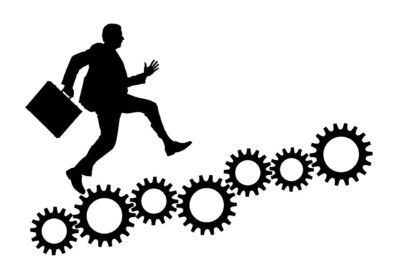 In our last post, we dove into how creating SMART goals can help a business achieve their ERP goal and maximize ROI. Today, we discuss the ones in charge of enforcing those goals, along with the overall people aspect of reaching business goals (or cross-functional collaboration).
In our last post, we dove into how creating SMART goals can help a business achieve their ERP goal and maximize ROI. Today, we discuss the ones in charge of enforcing those goals, along with the overall people aspect of reaching business goals (or cross-functional collaboration).
The Role of Leadership: Guiding the Path to Success
The ERP implementation journey requires a keen understanding of the critical role that leadership plays in steering the organization toward its objectives. The success of an ERP initiative is not merely contingent on technological prowess; rather, it hinges on the adept guidance and strategic vision of organizational leaders.
Leadership serves as the compass that navigates the complexities of ERP implementation and provides a clear direction to instill confidence in the entire team. This way, leaders create an environment where every member of the organization is not only aware of the ERP objectives, but also personally invested in their achievement. This sense of commitment becomes the driving force behind overcoming obstacles and realizing the full potential of the ERP system.
A central aspect of leadership is addressing challenges head-on. ERP implementation is often fraught with hurdles, ranging from resistance to change to technical complexities. Effective leaders proactively identify these challenges, strategize solutions, and communicate a cohesive plan to the entire organization. Their role extends beyond being problem solvers– leaders inspire resilience and adaptability, both qualities essential for navigating the unpredictable terrain of ERP implementation.
Alignment with the vision of successful ERP implementation is another crucial dimension of leadership in this context. Leaders are tasked with ensuring that every department and individual within the organization understands and internalizes the overarching vision. This alignment fosters synergy and collaboration, breaking down silos and creating a harmonious environment conducive to achieving ERP goals.
| Leadership Qualities | Description |
| Visionary | Clearly articulates the vision for ERP success, aligning it with overall business objectives. |
| Communication Skills | Effectively communicates the ERP goals, progress, and changes to the entire organization. |
| Adaptability | Demonstrates flexibility and adaptability to navigate challenges and changes during implementation. |
| Strategic Thinking | Thinks strategically, connecting ERP goals with the long-term success of the organization. |
| Empowerment | Empowers team members, fostering a culture of ownership and accountability. |
| Problem-Solving Skills | Proactively identifies and resolves issues, ensuring a smooth ERP implementation process. |
| Collaborative Approach | Encourages cross-functional collaboration and teamwork for achieving ERP goals. |
| Change Management | Effectively manages resistance to change, guiding the organization through transitions. |
| Decision-Making Ability | Makes informed and timely decisions, considering the impact on ERP objectives. |
| Results-Driven | Focuses on achieving measurable results aligned with ERP implementation goals. |
In essence, leadership transforms ERP objectives from mere plans into actionable and attainable realities. Through effective guidance, commitment cultivation, proactive problem-solving, and vision alignment, leaders set the stage for a successful ERP journey. As organizations unveil the critical role of leadership in ERP implementation, they gain valuable insights into overcoming common challenges and ensuring that every stakeholder is an active participant in the realization of ERP objectives. This collaborative and leadership-driven approach becomes the cornerstone for achieving enduring success in the dynamic landscape of ERP.
Cross-Functional Collaboration: A Pillar of Success
In the ever-evolving landscape of ERP implementation, cross-functional collaboration emerges as a defining factor for success. Collaboration across different functions within an organization dynamically evolves ERP goals and, consequently, the overall success of the implementation process.
Cross-functional collaboration is more than just a strategic choice. Collaboration is fundamental to the intricate tapestry of ERP evolution. As organizations adopt ERP systems to streamline their processes, different departments and functions need to seamlessly align their efforts. The interconnected nature of ERP goals often requires inputs and expertise from various corners of the organization. In this sense, the team needs collaboration to achieve a cohesive and comprehensive ERP strategy.
When teams collaborate seamlessly, breaking down silos and fostering an environment of shared insights and expertise, ERP goals cease to be isolated objectives and instead become interconnected facets of a holistic organizational vision. The synergy that cross-functional collaboration creates ensures that ERP goals not only address the specific needs of individual departments, but also resonate with the broader objectives of the entire organization.
Cross-functional collaboration also serves as a catalyst for innovation in ERP goal-setting. The diverse perspectives and specialized knowledge from different functions contribute to a more robust and forward-thinking approach to defining objectives. This collaborative innovation extends beyond the initial goal-setting phase, influencing the entire ERP implementation lifecycle. From customization and configuration to troubleshooting and optimization, a cross-functional collaboration framework ensures that each phase benefits from the collective intelligence of the organization.
The success of ERP goals hinges on their relevance to the daily operations and strategic aspirations of each department. Through cross-functional collaboration, organizations can ensure that ERP goals are not conceived in isolation, but rather are informed by the unique requirements and challenges different functions face. This approach not only enhances the practicality of ERP goals, but also garners support and buy-in from diverse stakeholders across the organization.
| Key Aspect
|
Description
|
| Clear Communication | Establish open channels for communication to ensure that information flows seamlessly between departments. Clear communication minimizes misunderstandings and aligns everyone with project objectives.
|
| Role Alignment | Defines and communicates the roles of each department involved in the ERP project. Ensures that everyone understands how their contributions impact the overall success of the project.
|
| Interdepartmental Training | Provides training sessions to employees across functions to enhance their understanding of ERP processes and foster a shared knowledge base. This promotes a collaborative environment and minimizes resistance to change.
|
| Shared Goals | Establishes common goals and objectives that align with the overall business strategy. Shared goals create a sense of unity and purpose, motivating teams to work collaboratively towards achieving successful ERP implementation.
|
| Cross-Functional Teams | Forms cross-functional teams with representatives from various departments. These teams can focus on specific aspects of the ERP project, fostering collaboration and leveraging diverse expertise for more effective problem-solving.
|
| Technology Integration | Implements collaboration tools and platforms that facilitate real-time communication and project tracking. Technology integration enhances efficiency and ensures that all team members have access to up-to-date information.
|
| Conflict Resolution | Develops a framework for resolving conflicts that may arise during cross-functional collaboration. Addressing conflicts promptly and constructively maintains a positive working environment and prevents disruptions to the project timeline.
|
| Regular Check-Ins | Schedules regular check-in meetings to assess progress, discuss challenges, and share updates. These meetings provide a platform for cross-functional teams to stay aligned and make necessary adjustments to keep the ERP project on track.
|
In conclusion, the pivotal role of cross-functional collaboration in the dynamic evolution of ERP goals cannot be overstated. As organizations navigate the complexities of ERP implementation, fostering a culture of collaboration becomes a strategic imperative. This collaborative ethos extends beyond the confines of ERP goals, permeating the organizational culture and laying the foundation for a successful, adaptive, and collectively driven ERP journey.






Leave A Comment